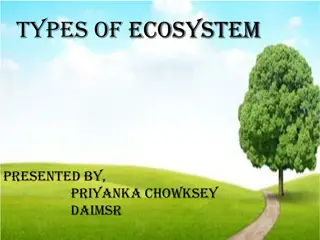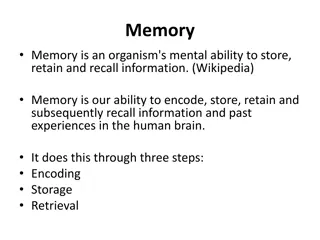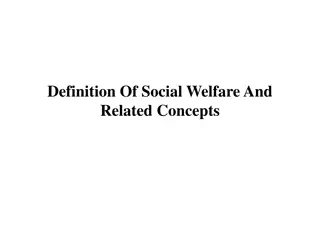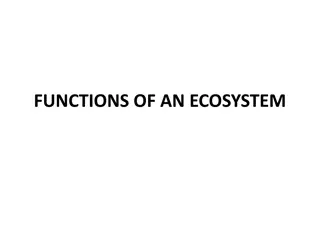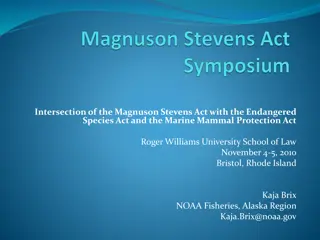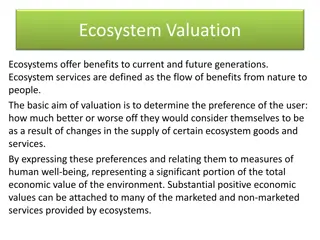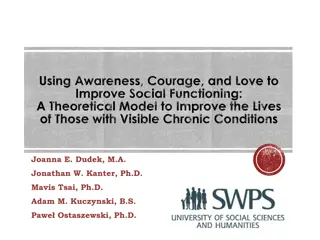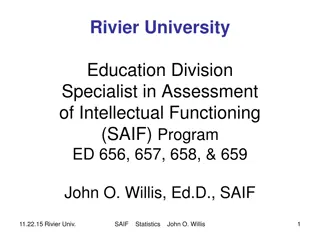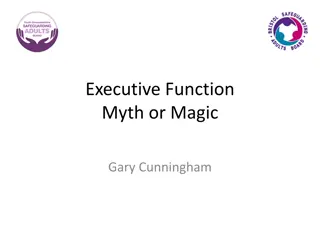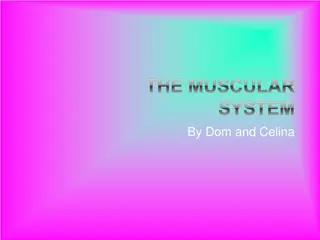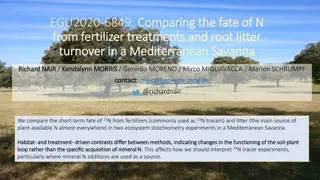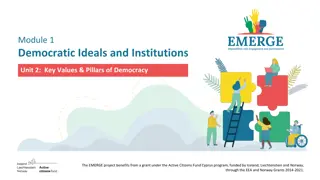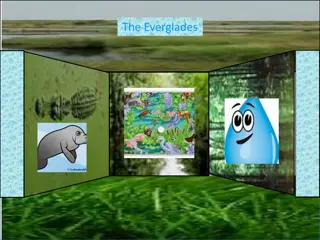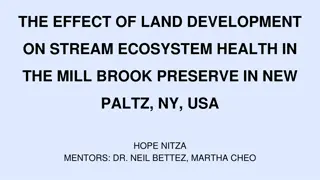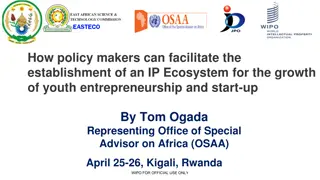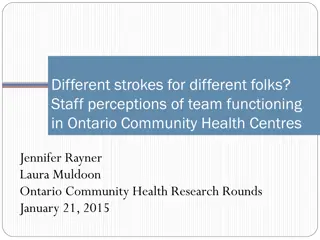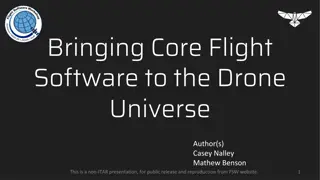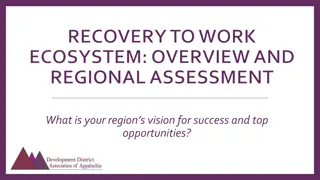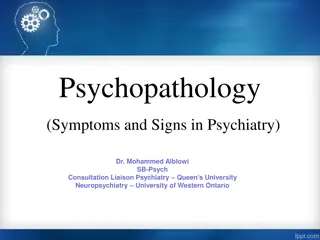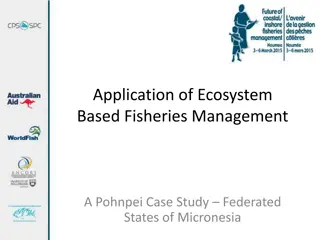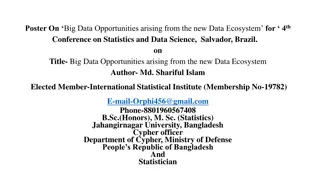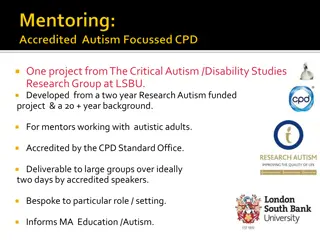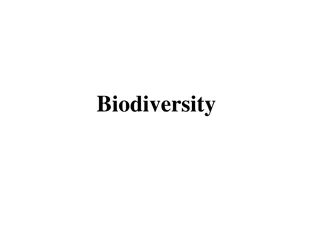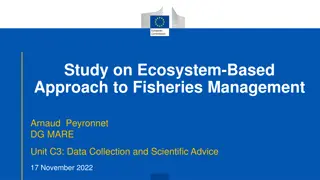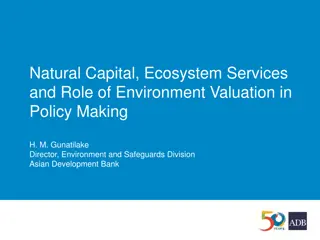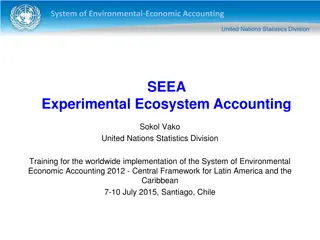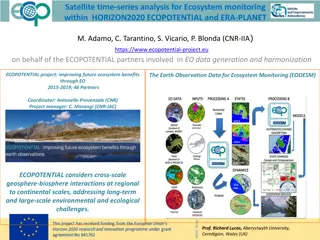Exploring Different Ecosystem Types and Functions
Learn about the major types of ecosystems such as Grassland, Aquatic, Forest, and Desert presented by Priyanka Chowksey of DAIMSR. Understand the components of an ecosystem, including biotic and abiotic factors, and the significance of different ecosystems like Forest Ecosystem and Desert Ecosystem.
4 views • 29 slides
An Ecosystem Services Approach to Water Resources
Discover the world of ecosystem services through mapping and classifying services provided by different landscapes using Google Earth. Learn how to link Google Earth to photographs and investigate various features to understand the production of ecosystem services over time.
2 views • 15 slides
Overview of O-RAN SC Bronze Release Objectives and Timelines
The content delves into the objectives of the OSC Bronze release focusing on end-to-end RAN communications and traffic steering use cases. It highlights the key elements of the Bronze release like health checks, RAN ecosystem connectivity, and timelines for bi-annual releases. Additionally, it discu
0 views • 18 slides
Developmental Disability Eligibility Reform Amendment Act of 2022 Overview
The Developmental Disability Eligibility Reform Amendment Act of 2022 introduces new definitions, eligibility criteria, and expands services for individuals with developmental disabilities. It defines intellectual disability, developmental disability, and introduces substantial functional limitation
3 views • 13 slides
Understanding the Basics of Memory Functioning
Memory is the mental ability to store, retain, and recall information through encoding, storage, and retrieval processes. It involves sensory, short-term, and long-term memory stages, with encoding encompassing semantic, acoustic, and visual aspects. The retrieval process involves locating and recov
0 views • 20 slides
Benefits of Mycorrhizae in Plant Nutrition and Ecosystem Health
Mycorrhizae play a crucial role in enhancing plant nutrient uptake, protecting against pests, improving plant growth, and fostering ecosystem stability. These symbiotic relationships provide various benefits such as increased nutrient supply, protection from pathogens, enhancement of plant growth fo
0 views • 9 slides
Understanding Social Welfare and Related Concepts
Social welfare encompasses a nation's system of programs, benefits, and services designed to address social, economic, educational, and health needs essential for societal well-being. The functional perspective emphasizes individual interdependence and societal efficiency, while the descriptive view
1 views • 9 slides
Cognitive Stimulation Therapy in Post-Acute Care: A Pilot Study
Cognitive Stimulation Therapy (CST) is an evidence-based group intervention designed for individuals with mild to moderate cognitive impairment. It aims to enhance cognitive functioning through various activities such as executive functioning tasks, multi-sensory stimulation, and reminiscence work.
0 views • 9 slides
Understanding the Key Functions of an Ecosystem
Ecosystem functions are vital for the survival of various components within them, with energy flow, nutrient circulation, and biogeochemical cycles playing significant roles. Energy flow starts with solar radiation and sustains producers, consumers, and decomposers, highlighting the interconnectedne
0 views • 21 slides
Ecosystem Considerations in Fisheries Management Laws
Analysis of the intersection of the Magnuson Stevens Act, Endangered Species Act, and Marine Mammal Protection Act in addressing ecosystem considerations within fisheries management. Evaluation of current regulatory frameworks and the need for an ecosystem-based approach towards fisheries and apex p
0 views • 15 slides
Exploring Ecosystem Dynamics: Food Chains, Energy Pyramids, and Trophic Levels
An exploration of key concepts in ecosystem dynamics, including food chains, energy pyramids, secondary consumers, and trophic levels. Discover the interconnected relationships between organisms in an ecosystem and the vital role of key species. Dive into the differences between food chains and food
0 views • 16 slides
Understanding Ecosystem Valuation and Non-Market Techniques
Ecosystem valuation aims to assess user preferences for ecosystem goods and services, determining the economic value attached to nature's benefits. Ecosystems offer provisioning, regulating, cultural, and supporting services crucial for human well-being. Various non-market valuation techniques like
0 views • 5 slides
Comprehensive Approach to Enhancing Social Functioning in Visible Chronic Conditions
This theoretical model explores the impact of visible chronic differences (VCDs) on individuals, emphasizing stigmatization and societal norms. It discusses the importance of social connection, highlights risks associated with VCDs, and presents the benefits of Functional Analytic Psychotherapy (FAP
0 views • 23 slides
SAIF Program at Rivier University: Assessment of Intellectual Functioning
Rivier University's Education Division offers the Specialist in Assessment of Intellectual Functioning (SAIF) Program led by John O. Willis, Ed.D. The program involves courses ED.656, .657, .658, and .659 focusing on statistics, test scores, measurement, and psychometrics. Resources from experts lik
0 views • 92 slides
Understanding Voluntary Manslaughter and Diminished Responsibility in Criminal Law
Voluntary manslaughter is a legal concept where certain special defenses can reduce a murder charge to manslaughter, giving judges discretion in sentencing. Diminished responsibility, introduced by the Homicide Act, allows individuals suffering from abnormal mental functioning during a killing to ha
0 views • 23 slides
Understanding America Study: Cognitive Functioning Measures
The Understanding America Study (UAS) focuses on developing web-based cognitive functioning measures, including tests for fluid abilities, verbal skills, executive function, and processing speed. Utilizing data from about 9,000 panelists, tests like the Stop and Go Switch task are administered onlin
0 views • 26 slides
Understanding Executive Functioning and Executive Dysfunction
Executive Functioning is a key aspect of cognitive function, encompassing various abilities such as planning, self-awareness, and emotion regulation. Executive Dysfunction, often resulting from frontal lobe injuries, can lead to difficulties in decision-making, social interactions, and learning. Thi
1 views • 21 slides
Understanding the Muscular System: Functions & Importance
Muscles are essential for movement, posture, circulation, and digestion in the human body. Without a properly functioning muscular system, vital processes like breathing and food digestion would be compromised. Maintaining muscle health through exercise and a nutritious diet is crucial to ensure opt
0 views • 11 slides
Understanding Nitrogen Dynamics in a Mediterranean Savanna Ecosystem
Investigating the fate of nitrogen from fertilizer treatments and root litter turnover in a Mediterranean Savanna ecosystem. The study compares the short-term fate of 15N tracers in ecosystem stoichiometry experiments, highlighting changes in soil-plant functioning. The research addresses N turnover
0 views • 10 slides
Institutional Framework and Antitrust Law in the EU
The European Union's institutional framework is defined by the Treaties of Lisbon, European Union, and Functioning of European Union. These treaties establish the EU's objectives, governance principles, and delineate competences. Additionally, EU antitrust law principles are based on the Treaties of
0 views • 16 slides
Understanding Neurodevelopmental Disorders in Childhood and Adolescence
Neurodevelopmental disorders in childhood and adolescence encompass a range of conditions including intellectual disabilities, communication disorders, autism spectrum disorder, and attention deficit/hyperactivity disorder. These disorders impact cognitive development, adaptive functioning, and comm
0 views • 30 slides
Understanding the Principles of a Functioning Democracy
A functioning democracy is built on principles such as the ultimate authority of the people, essential rights like freedom of expression, adherence to human rights, and the government's legitimacy from the electorate. Principles like accountability, freedom of assembly, and the separation of powers
0 views • 20 slides
Discovering the Diverse Ecosystem of the Everglades
The Everglades ecosystem in southern Florida is unique, offering a mix of temperate and tropical zones that support a wide variety of flora and fauna. Home to endangered species like the Florida panther and American crocodile, the region's wet climate and sawgrass landscapes make it a crucial habita
0 views • 4 slides
Impact of Land Development on Stream Ecosystem Health in Mill Brook Preserve, NY, USA
The study focuses on the effects of land development on stream ecosystem health in the Mill Brook Preserve in New Paltz, NY. It discusses the degradation of water quality due to surrounding land development and the importance of macroinvertebrates as indicators of ecosystem health. The review of lit
0 views • 23 slides
Facilitating an Intellectual Property Ecosystem for Youth Entrepreneurship Growth
In order to facilitate the establishment of an intellectual property ecosystem for the growth of youth entrepreneurship and start-ups, policy makers can take various interventions including revisiting the IP ecosystem, the need for evidence-based decision making, development of startups policies and
0 views • 9 slides
Analysis of Disability Data Using U.S. National Health Interview Survey
The U.S. National Health Interview Survey (NHIS) conducts an annual cross-sectional household survey to collect data on various health aspects, including disability. The Functioning and Disability module within NHIS includes a set of questions to assess difficulties in areas such as vision, hearing,
0 views • 49 slides
Enhancing Team Functioning in Ontario Community Health Centers
Explore the importance of team function in Ontario Community Health Centers (CHCs) and how it impacts quality of care delivery and innovation in primary care. Understand the dynamics of inter-professional teamwork, the multi-faceted concept of team function, and the potential for interventions to im
0 views • 35 slides
Revolutionizing Drone Operations with Windhover Ecosystem
Windhover Ecosystem, developed through NASA SBIR Phase I and II, offers a robust and open-source software solution for drone operations. The ecosystem includes integrated flight and ground control software, providing scriptable flight control, rapid prototyping, and full autonomy capabilities. Lever
0 views • 23 slides
Regional Recovery to Work Ecosystem Assessment and Goals
In this assessment, the focus is on the vision for success and top opportunities within the Recovery to Work Ecosystem. Goals include organizing stakeholders, engaging and supporting businesses, and providing wrap-around support for jobseekers. The discussions cover collaborative efforts, strengths,
0 views • 8 slides
Understanding Psychopathology: Symptoms and Signs in Psychiatry
Psychopathology involves the study of symptoms and signs in psychiatry, where signs are objective observations and symptoms are subjective experiences. Mental disorders encompass a range of issues affecting thoughts, emotions, behaviors, and relationships. Recognizing signs and symptoms such as slee
0 views • 31 slides
Ecosystem-Based Fisheries Management in Pohnpei: A Case Study
The application of ecosystem-based fisheries management in Pohnpei, Federated States of Micronesia, involves a top-down regulatory history followed by a bottom-up approach focusing on the establishment of marine protected areas. The characteristics of Pohnpei's coral reef fisheries show declines in
0 views • 18 slides
Big Data Opportunities in the New Data Ecosystem
A data ecosystem encompasses infrastructure, analytics, and data analysis, fostering partnerships and coordination to leverage the power of data. This ecosystem, driven by Big Data technologies and deep analytical talent, aims to address complex business challenges and drive innovation. The integrat
0 views • 5 slides
Overview of Classification of Psychiatric Disorders
Psychiatric disorders are illnesses with various manifestations that impact functioning due to disturbances in biological, social, genetic, and other factors. Two key classification systems, ICD-10 and DSM-5, categorize over 200 types of psychiatric illnesses. The ICD-10 includes categories like org
0 views • 18 slides
Understanding Autism & Disability: Mentor Training and Executive Functioning
This project from The Critical Autism/Disability Studies Research Group at LSBU focuses on mentor training for working with autistic adults, emphasizing goal-setting, action prioritization, time management, and social interactions. It explores concepts like executive functioning, individuality stren
0 views • 15 slides
Understanding Biodiversity: Importance and Implications
Biodiversity encompasses the variety of plant and animal life on Earth, including genetic, species, and ecosystem diversity. It plays a crucial role in maintaining ecological balance and ecosystem processes. Traits and interactions among species influence ecosystem function, emphasizing the signific
0 views • 14 slides
Ecosystem-Based Approach to Fisheries Management Study Overview
The study focuses on assessing the current state of implementing Ecosystem-Based Approach to Fisheries Management (EAFM) within the EU, providing recommendations to address challenges and advance towards the objectives of the Common Fisheries Policy (CFP). It outlines a systematic evaluation of exis
0 views • 24 slides
Understanding Natural Capital and Ecosystem Services Valuation for Effective Policy Making
Natural capital and ecosystem services play a crucial role in shaping policies related to environmental conservation and resource management. Valuing ecosystem services helps assess human welfare impacts and address market failures in allocating resources. Issues such as land degradation and loss of
0 views • 24 slides
System of Environmental-Economic Accounting and Experimental Ecosystem Accounting Overview
The System of Environmental-Economic Accounting (SEEA) and Experimental Ecosystem Accounting aim to integrate biophysical data, monitor ecosystem changes, and link them to economic activities. They provide a framework for accounting for ecosystem assets and services, playing a crucial role in the po
0 views • 34 slides
Symptomatic Control of Functioning Pancreatic NET
Pancreatic neuroendocrine tumors (panNETs) can be classified as functioning or non-functioning, with functioning tumors producing active hormones such as insulin, glucagon, gastrin, or VIP. Symptomatic control is crucial for managing these tumors, with diagnoses based on clinical syndromes and hormo
0 views • 19 slides
Satellite Time-Series Analysis for Ecosystem Monitoring in ECOPOTENTIAL Project
This project, part of HORIZON2020 and ERA-PLANET, focuses on satellite time-series analysis for ecosystem monitoring at regional to continental scales. It aims to improve ecosystem benefits through Earth Observation data, contributing to UN Sustainable Development Goal 15 by protecting, restoring, a
0 views • 19 slides
